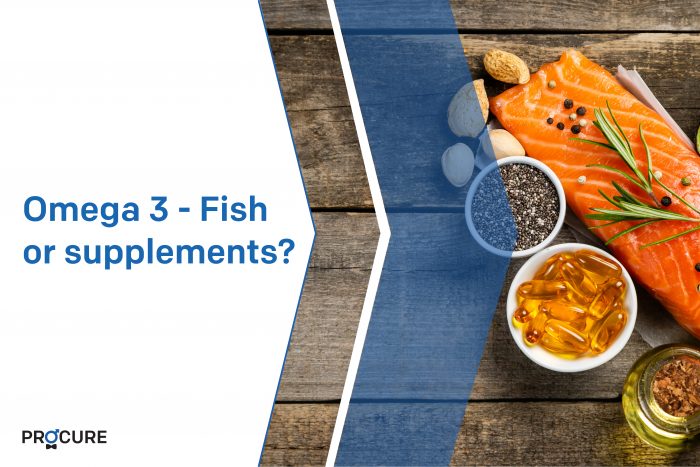We often forget the importance of certain “good” fats in our daily diet. This is the case of polyunsaturated fats: omega-6 and omega-3. These fats are capital for our organism, but the human body is unable to manufacture them. The only solution is to include them in our diet. If omega-6s are present in large quantities in the foods we are used to eating (meats, eggs, vegetables, etc.), omega-3s are present in few foods. They are found in fish, vegetable sources… and supplements sold in pharmacies, among others.
Popular for several years, omega-3 fatty acids are credited with many benefits for cardiovascular health, but also for the brain, hormonal and inflammatory systems. And we know that eating right starts with eating a variety of foods every day to get all the nutrients essential for good health. In fact, diet is one of the most widely considered risk factors in prostate cancer.
Tangible effects of healthy eating
We know that men in Western countries, such as in North America, are more likely to have prostate cancer than men in East Asian countries such as China and Japan. And that Asian men who have lived in North America for at least a generation are at the same risk as native North Americans.
This may be due to the Western diet, which contains less fruit, vegetables and fish, and more meat, dairy products, sugar, fat, and processed foods. The answers to this specific risk factor will come with research.
It is possible that an “anti-inflammatory” diet, which is to say rich in omega-3 (fish and other vegetable sources), vegetables (cooked tomatoes, broccoli, etc.), berries, green tea, and other foods, reduces the risk of developing prostate cancer.
The change in eating habits also has benefits for the prevention of cardiovascular disease and other cancers such as colon cancer. It should be remembered that many men with prostate cancer have been cured or their risk of dying is minimal and that a change in diet can have tangible effects on other diseases.
It is obvious that more studies on this subject are necessary. But in the meantime, it is strongly recommended to choose your food wisely, including those that are full of omega-3.
But what about omega-3s
Omega-3 fats are part of the family of essential polyunsaturated fats. As mentioned above, they are said to be essential since our body does not manufacture them but are necessary for the development of it.
According to the American Heart Association, several studies have demonstrated the protective effects of eating foods rich in omega-3, especially fish, against cardiovascular disease.
As for the NIH 2019 (National Institute of Health) in the United States, scientists are studying omega-3s to understand how they affect health. For example, people who eat fish and other seafood have a lower risk of several chronic diseases. But it is not clear whether these health benefits are simply from the consumption of these foods or the omega-3s contained in these foods.
The fact remains that it is essential to obtain them, ideally, through food to obtain the maximum benefits.
Sources of omega-3s
Fish
- Fish – such as canned light tuna, salmon, pollock, trout, etc. are a great source of omega-3. It is advisable to eat it at least twice a week.
- It is better to consume them fresh or canned because frozen fish lose their omega-3s over time.
- We can also think of canned sardines, but only if they are preserved in olive oil and not sunflower which is too rich in omega-6.
Plant sources
- Sources include walnuts, flax seeds, walnut oil, canola oil, soybeans, tofu, etc.
And where do supplements fit in all of this?
According to Diabète Québec, omega-3 supplements in the form of fish oil should be used under medical supervision, as they can cause certain side effects. Same story from the American Heart Association. In addition, the fact of looking for its omega-3 in fish rather than in supplements makes it possible to reduce the consumption of meat and to vary our food. Also, fish provide proteins of high nutritional value, minerals such as selenium, and antioxidants. These are all cardioprotective and healthy nutrients not found in a simple omega-3 supplement.
Take the time to visit each of our pages on this website, as well as our YouTube channel, in order to get familiar with the disease with our expert lectures, our section on available resources, the support that is offered to you.
Do you have any questions or concerns? Above all, do not hesitate. Contact us at 1 855 899-2873 to discuss with a nurse specializing in uro-oncology. It’s simple and free, like all our services.
Pages of our site that might interest you
Want to know more? Just click on one of the links below.
Am I at risk
How to reduce my risk
Signs and symptoms
The latest PROCURE news that might interest you
Every week we publish a blog article. Here are some we chose for you.
6 tips to keep your prostate healthy
5 facts to know about prostatitis
5 facts to know about large prostate (BPH)
Written by PROCURE. © All rights reserved – 2020



 ADDITIONAL RESOURCES
ADDITIONAL RESOURCES

